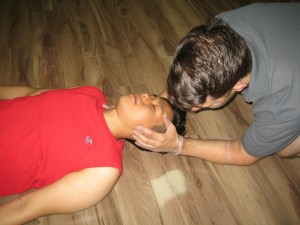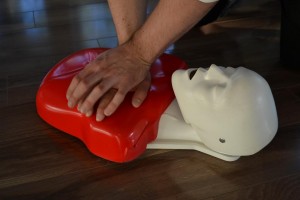
Red Deer First Aid is a popular first aid, food safety and CPR provider that offers quality training by OH&S and workplace approved certified instructors. Students can sign up for first aid and CPR training, stand-alone CPR and AED, or recertification (available for some awards) classes. Scheduling is very flexible, with full programs available six days a week and recertification available at a minimum of twice a week at all training centres. Instructors can even be hired for private training at your facility or the class can be offered at the training centre! Visit the Red Deer First Aid website for more details regarding first aid classes, schedules, and tuition fees.
Why should you choose Red Deer First Aid?
Easy, quick, and hassle-free enrolment
A student can enrol one out of four ways: e-mail, registration form, telephone, and in person. Any requests through e-mail or the registration form on the website will only be processed during business hours, the same goes for walk-ins and telephone calls. Be sure to conduct your business within Red Deer First Aid’s business hours so the staff can attend to you.
- Email: info@firstaidcourses.ca
- Website: www.firstaidreddeer.ca
- Telephone: 1-888-870-7002
On-line registration is available 24 hours a day 7 days a week. On-line classes in WHMIS, H2S and other programs are also available 24 hours per day.
Cheap and affordable fees
Total fees are paid during enrolment so students don’t have to worry about additional expenses while training. Fees include tuition, taxes, certificates, and supplemental training manuals. Other providers in Red Deer can’t compete with the low prices and quality programs offered at Red Deer First Aid. If a student decides to drop out, full refunds are given to him or her. Just remember to notify Red Deer First Aid at least 72 hours before you drop out.

Quality training programs
All training programs are taught and overseen by instructors certified by Alberta OH&S approved instructors. Full training courses for basic first aid run for 14-16 hours per week, usually available 6 out of 7 days in a week. The basic first aid curriculum includes fall, bleeding, choking, and anaphylactic emergencies to name a few. CPR is also included, teaching students how to perform chest compressions and give rescue breaths.
Stand-alone CPR classes are also available if you don’t want to enrol in a full program. There are three levels: A, C, and HCP, and a student has to choose one of them. Health care providers can take level HCP, while first timers can take A and C. HCP and C include both pediatric and adult CPR and AED training while A only has adult CPR and AED training. The three levels are 4, 5, and 6 hours long.
Certificates
To pass a class, a student needs:
- Complete attendance
- At least 75 percent on the exam
- Good demonstration of first aid and CPR skills
Certificate cards are awarded to all students who pass a class. These certificates are wallet-sized but wall-mount sizes can be requested. The certificates are only valid for three years and some are renewable through recertification programs. Standard first aid recertification is available twice a week, 8 hours long. CPR level C certificate renewal is included in first aid recertification.
Did You Know?
Eczema and its complications
Eczema is a chronic skin inflammation that is usually self-limiting, fading a way in a few days. However, prolonged symptoms can cause complications that are very damaging to the skin and its underlying structures.
- Neurodermatitis happens when the skin becomes very thick and leathery due to scratching and irritation. The patches of skin can become red, raw, and darker when it dries and heals.
- Skin infections are the most common complication of eczema, especially if prolonged scratching causes a wound in the skin. These sores and fissures can become infected if not properly cleaned and protected.
- Eye complications are common in children, since eczema usually appears on their face and scalp. When the rash is on the face, it can affect the eyelids and can cause irritation of the eye.